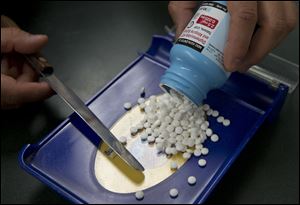
EDITORIAL
Big Pharma buys another win
12/20/2017
No interest group has spent more money to win a ballot issue in the state of Ohio than Big Pharma did on Issue 2, which failed by a margin of 79 percent to 21 percent in November.
The proposal would have prohibited drug companies from charging more to the state of Ohio and any of its health-care programs than the price negotiated by the U.S. Department of Veterans Affairs.

A pharmacy technician fills a prescription for an anti-diarrhea medication at a pharmacy, in Sacramento, Calif.
Click here to view more Blade editorials
The outcome of the vote is dismaying on multiple levels. The obvious one to start with is the pernicious influence of money in politics.
“We knew all along they were going to come in and spend whatever was necessary to win,” pro-Issue 2 spokesman Dennis Willard told The Blade. “The unsavory part of that is those excess profits came from selling overpriced drugs, and they used that money to defeat an effort to lower drug prices.”
Indeed. Since the passage of the Hatch-Waxman Act in 1984, the pharmaceuticals industry has consistently ranked among the top three most profitable industries globally, grabbing first place more years than not. Of the many factors that have contributed to Big Pharma’s decades-long bonanza, none have anything to do with the quality of the drugs the companies are selling.
So that the industry broke ballot issue spending records to ensure their continued ability to charge the state of Ohio rapacious rates is unsurprising. Here’s what is surprising, and thoroughly depressing: drug companies outspent their opponents by a margin of 3.6-to-1 and went on to win the vote by a 3.7-to-1 margin. They got almost exactly what they paid for in electoral results, and they will get much, much more in profits for their $58 million investment in Ohio politics.
“It’s a lot of money, but education’s expensive,” said “No On 2” spokesman Dale Butland.
And what did Big Pharma wish to teach Ohioans? In essence: If we can only charge Medicare and Medicaid what we are required to charge the Department of Veteran Affairs, then we will have no choice but to raise our prices for all other insurance providers.
So the case made to Ohioans — at great and disproportional cost — was that if we stood up to the bullies, they would take even more of our lunch money. It’s a good bet that, having let ourselves be bullied again, they will take more of our money anyway.